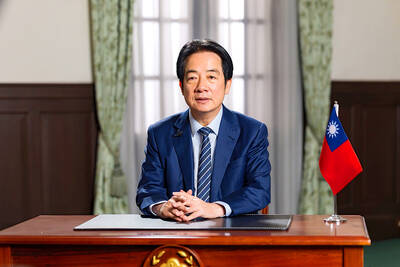Australian super-songstress Kylie Minogue brings her musical extravaganza, KylieX2008, to Taipei’s Zhongshan Soccer Stadium (中山足球場) on Thursday. Tickets range in price from NT$1,500 to NT$6,000 and are available online at www.ticket.com.tw or by calling (02) 2341-9898.P>
KylieX2008 kicked off last May in Paris and has already traveled to more than 40 cities in Europe, South America and Asia. The “X” references the fact that this is the singer’s 10th concert tour, features 10 back-up dancers (and four acrobats) and is in support of her 10th album, titled (guess what?) X.
The tour’s production cost was a staggering US$16 million (about NT$514 million). It marks Minogue’s return to touring after defeating breast cancer in early 2006, and the singer has taken the opportunity to go all out for her fans. In previous media interviews, Minogue said that Freddie Mercury, the late Queen frontman, inspired her.
“I’m releasing my inner Freddie Mercury. It’s hard to explain but parts of the show are so over the top. When I sing Disco Needs You, it’s a real Freddie moment,” she told UK tabloid the Sun.
Minogue’s show features costumes designed by Jean-Paul Gaultier and is divided into seven acts, which Minogue has described as “shows within a show,” including the futuristic disco-themed opening act, Xlectro Static, in which Minogue has performed her addictive smash hit Can’t Get You Out of My Head at previous concerts. Another act is based on US high school pep rallies and has Minogue and her dancers in cheerleader outfits, while in yet another Minogue makes her grand entrance perched in a giant skull suspended above the stage while performing Like a Drug from her latest album.
Tickets for the singer’s initial run of concerts in the UK sold out within 30 minutes last December, and the enthusiastic response by fans on the tour’s European leg supported additional dates in South America, Asia and Australia. The success of KylieX2008 may be making up for Minogue’s reported disappointment over X’s relatively lackluster sales in the US (the tour currently has no stops scheduled in that country). The album, which the singer began working on towards the end of her cancer treatment in 2006, was a chart topper in Europe, Australia, the UK, Japan and Taiwan, but stalled at No. 139 on the US Billboard 200 despite good reviews for its electronica-tinged pop tracks.— CATHERINE SHU

This month the government ordered a one-year block of Xiaohongshu (小紅書) or Rednote, a Chinese social media platform with more than 3 million users in Taiwan. The government pointed to widespread fraud activity on the platform, along with cybersecurity failures. Officials said that they had reached out to the company and asked it to change. However, they received no response. The pro-China parties, the Chinese Nationalist Party (KMT) and Taiwan People’s Party (TPP), immediately swung into action, denouncing the ban as an attack on free speech. This “free speech” claim was then echoed by the People’s Republic of China (PRC),

Exceptions to the rule are sometimes revealing. For a brief few years, there was an emerging ideological split between the Democratic Progressive Party (DPP) and Chinese Nationalist Party (KMT) that appeared to be pushing the DPP in a direction that would be considered more liberal, and the KMT more conservative. In the previous column, “The KMT-DPP’s bureaucrat-led developmental state” (Dec. 11, page 12), we examined how Taiwan’s democratic system developed, and how both the two main parties largely accepted a similar consensus on how Taiwan should be run domestically and did not split along the left-right lines more familiar in

Many people in Taiwan first learned about universal basic income (UBI) — the idea that the government should provide regular, no-strings-attached payments to each citizen — in 2019. While seeking the Democratic nomination for the 2020 US presidential election, Andrew Yang, a politician of Taiwanese descent, said that, if elected, he’d institute a UBI of US$1,000 per month to “get the economic boot off of people’s throats, allowing them to lift their heads up, breathe, and get excited for the future.” His campaign petered out, but the concept of UBI hasn’t gone away. Throughout the industrialized world, there are fears that

The Democratic Progressive Party (DPP) controlled Executive Yuan (often called the Cabinet) finally fired back at the opposition-controlled Legislative Yuan in their ongoing struggle for control. The opposition Chinese Nationalist Party (KMT) and Taiwan People’s Party (TPP) acted surprised and outraged, but they should have seen it coming. Taiwan is now in a full-blown constitutional crisis. There are still peaceful ways out of this conflict, but with the KMT and TPP leadership in the hands of hardliners and the DPP having lost all patience, there is an alarming chance things could spiral out of control, threatening Taiwan’s democracy. This is no